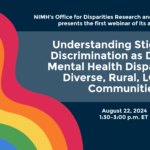by Dr. Amir Ahuja, Board-Certified Psychiatrist and Director of Psychiatry at the Los Angeles LGBT Center
Dr. Ahuja is a Board-Certified Psychiatrist and a prominent advocate for the LGBTQ+ community. As the Director of Psychiatry at the LA LGBT Center, recognized as the largest LGBT Center in the world, he leads a dedicated team that provides care to over 2,500 patients annually.
Major depressive disorder (MDD) is among the most prevalent mental health issues in the United States, impacting more than 21 million adults nationwide. This debilitating condition is not confined to any specific age, race, ethnicity, socioeconomic status, or religious affiliation; it can affect anyone. While only 4.5% of the U.S. population identifies as LGBTQ+, a staggering 39% of this community reported facing a mental health challenge within the last year. Additionally, LGBTQ+ individuals are 2.5 times more likely to seek mental health services compared to their cisgender heterosexual counterparts. These statistics highlight the unique struggles faced by the LGBTQ+ community, including discrimination, rejection from family and society, and a lack of trust in the healthcare system.
In this discussion, Dr. Amir Ahuja, MD, a Board-Certified Psychiatrist, shares valuable insights into the specific challenges faced by members of the LGBTQ+ community regarding depression, along with effective coping strategies that can be employed.
1. Understanding My Extensive Background and Experience in Treating Depression
Depression is a multifaceted condition that defies simple categorization. It presents itself in various forms, with some types persisting despite numerous treatment attempts. In my role as the Director of Psychiatry at the Los Angeles LGBT Center, I have had the privilege of assisting thousands within the LGBTQ+ community as they navigate their depression. My extensive experience encompasses all variations of depression, including cases of treatment-resistant depression (TRD), which often poses significant challenges due to its complex nature.
Treatment-resistant depression (TRD) is typically defined as insufficient response to two or more antidepressant medications, administered at therapeutic doses and durations, during the current depressive episode. This often leads individuals diagnosed with TRD to cycle through different treatments without finding relief, creating a sense of frustration and hopelessness.
2. Identifying Unique Challenges Faced by LGBTQ+ Individuals in Managing Depression
Members of the LGBTQ+ community frequently experience a heightened sense of isolation compared to their cisgender heterosexual peers. Many individuals face rejection from family members and societal ostracism, which can exacerbate feelings of loneliness and despair. This experience is further complicated by the historical trauma associated with the AIDS epidemic, where many gay men lost partners and friends, contributing to a lingering sense of grief and loss.
Moreover, there are significant disparities in the types of trauma encountered by LGBTQ+ people, including instances of intimate partner violence, harassment, and discrimination. Additionally, health disparities emerge within this community, as certain subsets of LGBTQ+ individuals report higher rates of heart disease, cancer, and shorter lifespans, highlighting the need for tailored mental health support.
3. The Critical Role of Community Resources and Support Networks in LGBTQ+ Mental Health
Culturally competent resources are essential for the LGBTQ+ community to access the healthcare services they require. Many individuals, particularly transgender individuals, have encountered negative experiences within healthcare settings, leading to a reluctance to seek help. Establishing a welcoming environment is crucial for rebuilding trust and encouraging individuals to seek care. Research consistently indicates that members of the LGBTQ+ community feel more at ease with providers and centers that offer culturally competent care.
At the LA LGBT Center, which stands as the world’s largest LGBT center, we provide vital resources and support to LGBTQ+ patients managing their depression. While not everyone resides in urban areas with access to physical centers, numerous online resources are available, such as DepressionLooksLikeMe.com. This platform offers mental health resources specifically tailored for the LGBTQ+ community, including directories to locate healthcare professionals who are LGBTQ+ friendly and access to live support with trained counselors.
4. Effective Strategies for Discussing Mental Health with LGBTQ+ Patients
In my practice, I approach mental health discussions with my LGBTQ+ patients with the same compassion and understanding as I do with all patients. I begin by demystifying the experience of depression, as many misconceptions exist. Depression is not merely a fleeting mood or a choice that can be overcome at will; it’s a significant mental health condition that can affect anyone, regardless of age, gender, sexuality, race, ethnicity, socioeconomic background, or religious beliefs. Many erroneously equate depression with mere sadness, but it often manifests as feelings of numbness, disconnection, and an overwhelming absence of joy, accompanied by fatigue and cognitive difficulties. Understanding these nuances is crucial in normalizing conversations about mental health and reducing the stigma surrounding it.
When evaluating treatment options for patients experiencing depression, I prioritize understanding their personal goals. This approach enables me to assist them in achieving these objectives while effectively managing their mental health challenges.
5. Empowering LGBTQ+ Individuals to Seek Help for Depression
You are valued, your voice matters, and you are not alone in this journey. Help is readily available through a simple phone call or text. Many compassionate individuals, including myself, are dedicated to supporting you in overcoming depression and achieving a fulfilling life. We genuinely care about your well-being and want to see you thrive, but it’s essential to take that crucial first step in reaching out for assistance. Remember, seeking help is a sign of strength, and it’s an important move toward regaining control over your mental health.
6. Valuable Resources for LGBTQ+ Individuals Living with Depression
This post was sponsored by Johnson & Johnson.
Essential References for Understanding Depression
- National Institute of Mental Health. Major depression. Accessed November 1, 2024. https://www.nimh.nih.gov/health/statistics/major-depression#part_2563
- Mental Health America. Depression. Accessed November 1, 2024. https://www.mhanational.org/conditions/depression
- Mental Health America. LGBTQ+ Communities and Mental Health. Accessed November 1, 2024. https://www.mhanational.org/issues/lgbtq-communities-and-mental-health
- Agency for Healthcare Research and Quality. Definition of treatment-resistant depression in the Medicare population. https://www.cms.gov/Medicare/Coverage/DeterminationProcess/downlo ads/id105TA.pdf. Published February 9, 2018.
- Health.com. 7 Major Health Disparities Affecting the LGBTQ+ Community. Accessed November 1, 2024. https://www.health.com/mind-body/lgbtq-health-disparities#:~:text=People%20in%20the%20LGBTQ%2B%20community%20face%20significant%20health%20disparities%20that,use%2C%20and%20mental%20health%20disorders











